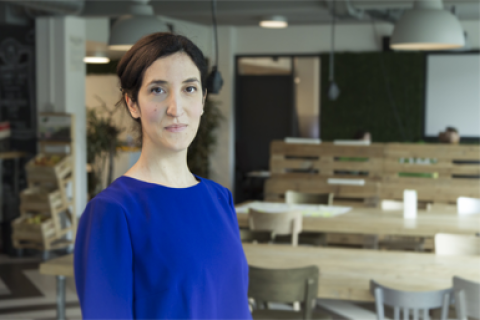Laudatio Gerda Andringa, presenter: Joëlle Stocker, External Officer of the Academic Affairs Council of University College Roosevelt
In the study of liberal arts and sciences, students have the freedom to combine their own fields, tailored specifically to them. In such an environment, a professor may choose to do one of two things. The first is that they pre-select the most important pieces of information for every student to learn. That way, the student has the necessary information to choose whether they would like to continue in that field but they may also only hold on to the information they find most relevant. Alternatively, that professor may give their students the tools and skills to find their own way through the field. In this case, they can find the right information by themselves and personally discover which information is most relevant. In working on the teacher prize award, it has become abundantly clear that Dr Andringa has managed to master both. In the courses she teaches at UCR, students are not only required to understand basic principles and explain scientific concepts. They are also taught to critically reflect and read the information that is presented to them. Dr Andinga supports the students as they work together in grasping difficult concepts so that they may continue to do this in the future without her aid as well. This is only one of the many reasons why Dr Andringa fully deserves the prize she is about to receive today.
While assembling the portfolio for Dr. Andringa back in November, I was struck by how many of her students were willing to help, including a number of alumni. I think this demonstrates very clearly how well Dr. Andringa manages to touch her students, motivate them and inspire them within and outside the field of cognitive science. I believe this is also what makes the cognitive science track at UCR so popular among students, many of which do not major in the track, but choose to take courses with Dr. Andringa nonetheless. This is because in her teaching she has the ability to shape her courses in such a way that it is simultaneously challenging for students with a stronger background in the field, and achievable for students that have less experience.
Rather than handing out the correct information on a silver platter, Dr. Andringa points students in the right direction to become an academic, giving them the space to fail and the guidance to grow again. Though active thought and discussion is encouraged through her assignments, Dr. Andringa also carries this engagement over throughout her lectures. By frequently asking questions, patiently listening to student answers, even if they are entirely incorrect, and carefully guiding them into the correct thought, she creates a safe environment where students can genuinely make their own way through the content of the course. On top of that she makes sure to always present the latest research and studies in the field, leading to an always evolving and up to date set of courses.
Because of this encouraging nature, students often feel a personal incentive to understand the course content themselves. In such cases, Dr. Andringa takes a lot of time for individual guidance to answer questions or discuss individual student projects, often even being willing to meet with students in the evening or over the weekend so they can reach a higher level of understanding.
Dr. Andringa’s teaching style revolves around letting her students reach their highest potential. But this is not all that makes Dr. Andringa an exceptional professor. The influence that she has had in the community extends to governance positions, having been a member of the UCR council and taking a lead role in the university’s adaption to the new COVID-19 regulations. At present, she also plays an important role in the inner workings of the university as the head of the Science Department. In this function, she is not only able to improve the Department as a whole by taking a position in the Board of Studies, but is also able to help and guide more students in a broader perspective. Naturally, she often finds herself as the main communicating vessel between the students and the overall science department.
Her reach also extends to the province of Zeeland, where she utilizes her knowledge and skills to give back to the province’s community, for example by organizing projects in which she, together with students, attempts to find new ways to combat cognitive decline in the elderly.
Ultimately, the value of teaching is not limited to the success of motivating and training the student community, but to improve society. Dr. Andringa has managed to achieve greater understanding among her students of the contribution that they can make to society and she has created confidence in society that they can rely on the academic community.
This is why we are honoured and proud to celebrate the Outstanding Teaching Award presented today to Dr. Andringa.
Thank you.




